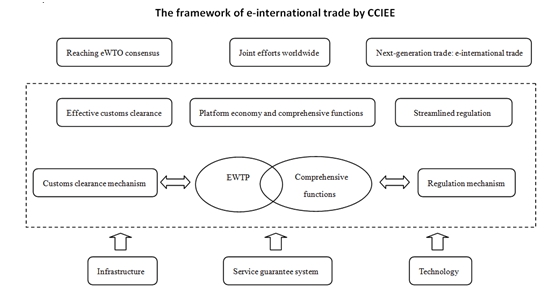Top trade negotiator calls for China to set rules on int'l e-commerce
- By Zhang Jiaqi
 0 Comment(s)
0 Comment(s) Print
Print E-mail China.org.cn, September 22, 2017
E-mail China.org.cn, September 22, 2017
China should become a rule setter in the absence of rules and standards in international e-commerce, said Long Yongtu, China's chief negotiator for its entry to the World Trade Organization and former vice minister of commerce, on Sept. 21.
Long spoke at the publication press conference of a new report on "e-international trade" by the China Center for International Economics Exchanges (CCIEE), a Beijing-based think tank.
At the press conference, CCIEE chief economist Chen Wenling proposed a new e-international trade framework, which is based on the internet and new technologies, driven by the market, and features a highly efficient customs clearance system and regulation mechanism. This new framework incorporates various components such as the business-to-business-to-consumer (B2B2C) e-commerce model and the comprehensive Electronic World Trade Platform (eWTP) proposed by Alibaba founder Jack Ma.
|
|
|
The framework of e-international trade by the China Center for International Economics Exchanges (CCIEE) |
Long spoke highly of the significance of the CCIEE framework. He said it is commendable that China takes the initiative and makes this move on the way to establishing international standards and rules for e-international trade, especially as international e-commerce prospers and China seeks to increase its voice in global governance.
In recent years, China has become a significant global market player in e-commerce. China's online retail volume in 2016 accounted for over 40 percent of the world sum. In addition, e-commerce is also becoming a larger portion of China's international trade. Long estimated that China's cross-border e-commerce will make up for 27 percent of its international trade this year, and the proportion could increase to 37 percent by 2020.
As a first mover in cross-border e-commerce, China has great potential and much to fulfill in this cause when the WTO is just making preliminary attempts at formulating a cross-border e-commerce rules system, Long said.
Already probing in practice, Zhengzhou in central China's Henan Province has set up a bonded zone for e-international trade using the B2B2C model. Under this model, a comprehensive platform, be it a logistics park or a service company, acts as a service and product delivery channel between businesses and consumers to navigate around the complicated obstacles in international trade.
These third parties take on tasks such as data gathering with the help of advanced technologies in order to deliver products and services with higher efficiency and lower cost. They can also provide logistics support, coordinate company demand with government policies and so on.
"In the past, the government could obtain 1 billion yuan of tax from 300 million [e-commerce] orders, but now under the B2B2C model, the tax the government can obtain from 50 million orders is up to 6 billion yuan," said Xu Ping, president of Henan Bonded Zone Group. "Moreover, the cost in logistics decreases by 56 percent under the B2B2C model."
One of the other prominent components of the CCIEE framework is the eWTP, which gathers multiple parties including the producers, distributors, retailers and consumers to build a more inclusive environment, making it easier for small and medium-sized enterprises to expand their trading capabilities worldwide.
Chen said the CCIEE's e-international trade framework is more than the eWTP as it integrates comprehensive functions like financial services, logistics, and highly efficient customs clearance and government regulation, which are supported by both infrastructure and technology, and will be conducive to building up an increasingly inclusive, fair, free, convenient, and sharing trade environment as a whole.







Go to Forum >>0 Comment(s)